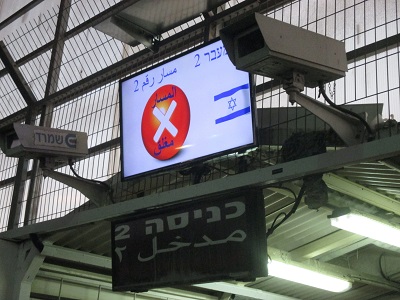
By Tamar Fleishman
On the winding road leading to the soldiers’ posts stood a woman, her head dropped and her body leaning on the separating railing.
“Are you ill?” I asked and felt stupid, because her tearful eyes, the trembling body, yellowish complexion and broken sobs left no room for doubt.
“Cancer”, the woman said, and tapped her chest. “To hospital”.
We crossed arms and proceeded slowly, step by step.
At the sight of her face people in line hurried to make way, and a toddler who was pushed aside with his mother looked at the woman and began to cry.
Inside the inspection post, opposite the soldier, we had to release our arms in order to hold our IDs.
The woman took out a green ID and a doctor’s referral and a hospital document and a transit permit, and held them to the glass window with both hands. I held my own blue ID above her green one. The woman’s body still trembled, her head bent forward and her face – like her papers – was on the glass pane.
The soldier’s eyes moved from the documents to the computer screen and back to us and then to the screen again and then to the two IDs, her green and my blue. Then he looked at me, not at her, and said: “You can get through. She can’t.”
For once I, who never lack words, could only utter “What…” “You can get through. She’ can’t.” Did he think I didn’t hear him the first time? And he explained to me, not to her: “She’s blacklisted”.
Then I lost it.
I don’t know what I said. I only know I said a lot, and that we wouldn’t budge. There was nowhere to go.
And then ..
I have no idea why and how and how soon this quasi-miracle happened. I only know that the soldier then said in a soft voice, as though his voice knows that we are one: “Okay, go on”. Again we held each other and began to walk like one body, slowly, step after step. After one or two steps I left her for a second, returned to the window, to the soldier, and apologized. Even though I didn’t know what I was apologizing for, I knew it was the right thing to do.
We still had a ways to go until the exit from the checkpoint compound, to the other side. A short-long way at the end of which, right there on the curb, she collapsed in a quiet sob, her head between her hands.
I called for help and the bus drivers at the gathering station took charge of the woman for the rest of the way.
I accompanied her with my gaze until she was seated next to the driver and I saw the thin hand raised in greeting and gradually disappearing.
(Translated by Tal Haran.)
– As a member of Machsomwatch, once a week Tamar Fleishman heads out to document the checkpoints between Jerusalem and Ramallah. This documentation (reports, photos and videos) can be found on the organization’s site: www.machsomwatch.org. The majority of the Spotlights (an opinion page) that are published on the site had been written by her. She is also a member of the Coalition of Women for Peace and volunteer in Breaking the Silence. She contributed this article to PalestineChronicle.com.





